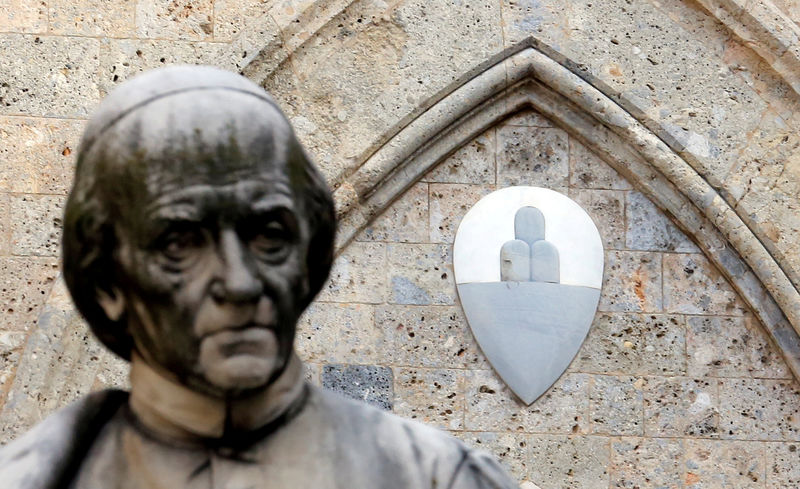By Elisa Anzolin and Silvia Aloisi
MILAN (Reuters) - Italy's third biggest lender Monte dei Paschi di Siena said on Sunday it would press ahead with a last-ditch plan to raise 5 billion euros on the market by year-end after the European Central Bank refused to give it more time to recapitalize.
The decision by the ECB's supervisory board piles pressure on the Italian government to inject money into the bank but the Tuscan lender on Friday said it would carry on with its own private sector scheme, despite signs of scant investor interest.
Rome is ready to intervene with an emergency decree to rescue the bank if needed, a government source said on Friday.
The crisis at the world's oldest bank is playing out against a backdrop of political instability in Italy after Prime Minister Matteo Renzi's resignation last week following a heavy defeat in a referendum on constitutional reform.
Italy's president on Sunday asked Renzi's foreign minister, Paolo Gentiloni, to form a government and he could be ready as early as Monday to present his list of proposed cabinet members to the head of state.
Monte dei Paschi, which fared the worst in European stress tests this summer, had asked the ECB for a three-week extension to Jan. 20 to raise the money it needs to avert collapse because of the political turmoil unleashed by Renzi's resignation.
But the ECB on Friday rejected the request on the grounds that a delay would be of little use and that it was time for Rome to step in, a source close to the matter said. The bank says it has not received a formal communication from Frankfurt.
The eleventh-hour private solution being drawn up by the bank, advised by JPMorgan (NYSE:JPM) and Mediobanca, involves reopening a debt-to-equity swap offer to 40,000 retail investors holding 2.1 billion euros of the bank's subordinated bonds, Monte dei Paschi said in a statement after a board meeting on Sunday. But this needs the approval of market watchdog Consob.
The initial offer, which raised 1 billion euros from institutional investors, had been deemed too risky for the vast majority of ordinary investors.
CONFIDENCE
Under the plan, Qatar's sovereign wealth fund could put in another 1 billion euros, while a consortium of banks would try to sell shares for the remainder in the market but without underwriting the issue, a senior banker said.
As Monte dei Paschi di Siena's board met on Sunday, a source close to the board said the fact that Gentiloni had been asked to form a government gave the bank confidence it could still pull off the privately funded capital raise.
"There's still time. Qatar is in the game and available to put in the amount that is being talked about," the source said.
However, another source close to the matter acknowledged the bank's bid for cash on the market was a desperate move. "The ECB has not responded yet. There's no government yet. The bank has got nothing to lose," the source said.
The bank had been in contact with Consob since Friday to discuss the reopening of the debt swap, a politically sensitive move that could expose the lender and the market watchdog to accusations of bending the rules. Consob's preliminary reaction to the plan was positive, two sources said.
However, another source said no decision would be taken before the ECB formally communicates its rejection of the bank's request for an extension, which should happen early this week.
According to the senior banker, the lender would argue that under European rules, retail investors risked losing all their money if the state had to intervene, so they would be better off converting their bonds.
The bank's fate is a political hot potato in Italy.
Luigi Di Maio, a leader of the anti-establishment 5-Star Movement that is ahead in opinion polls, said on Sunday the bank should be nationalized while accusing Renzi's Democratic Party (PD) of using the crisis to rebuff calls for snap polls and justify the need for a quick, unelected government.

PD Chairman Matteo Orfini said: "The market solution is the best. Should it not succeed, the bank must be stabilized while respecting EU rules."
(additional reporting by Stefano Bernabei, writing by Silvia Aloisi; editing by Ros Russell, Bernard Orr)